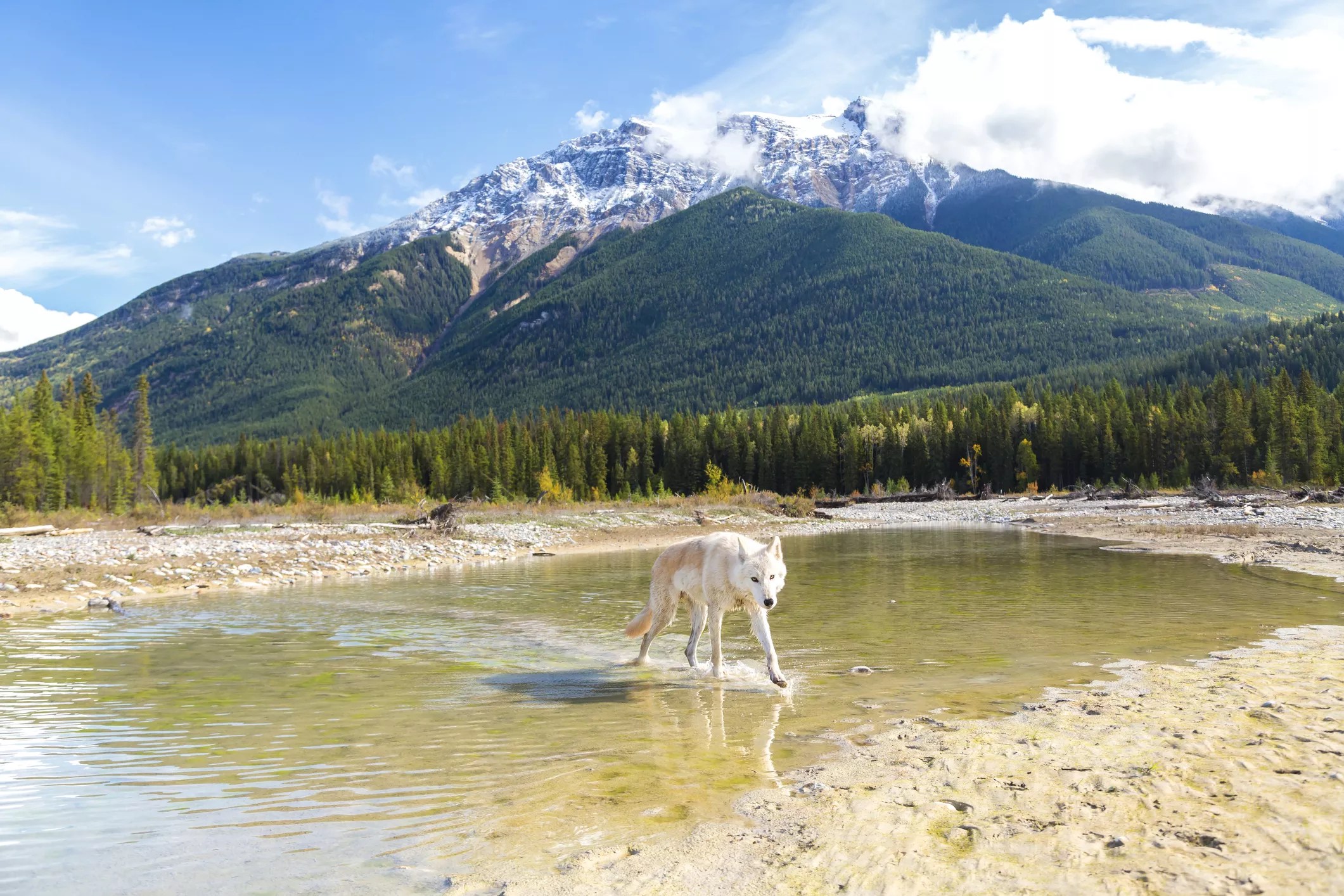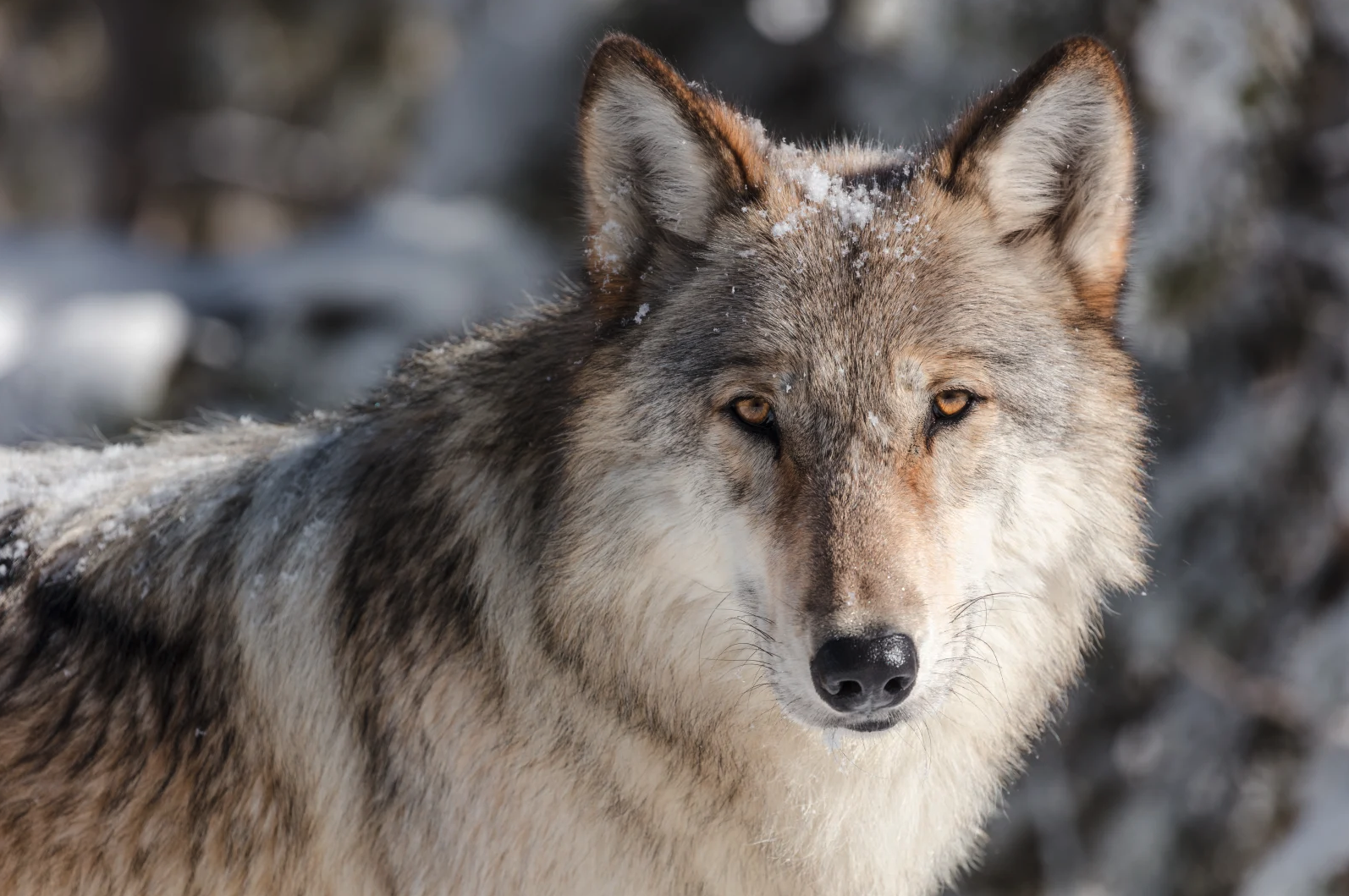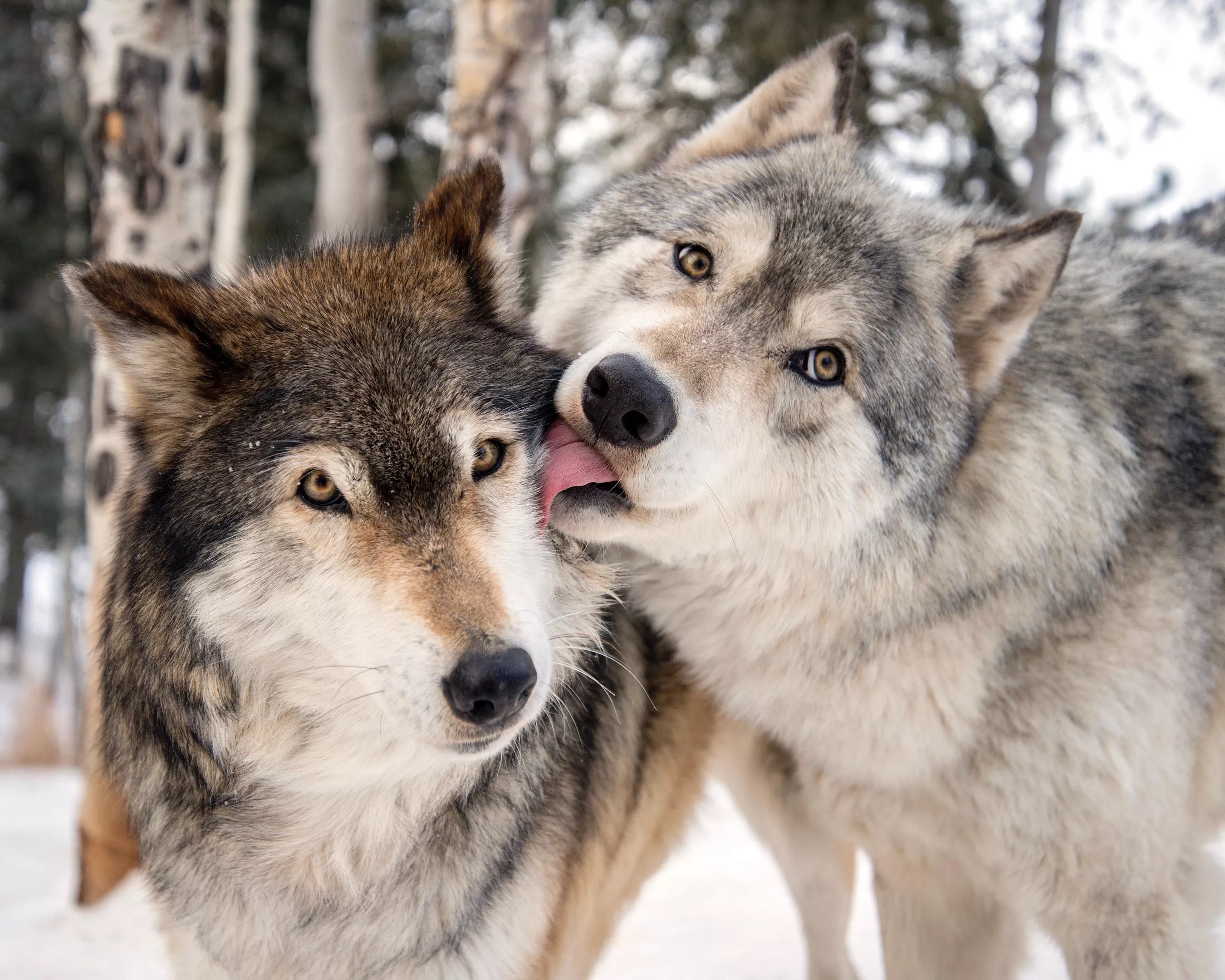
Getty Images

Audio By Carbonatix
A pack of wolf reintroduction bills is making its way through the Colorado Legislature, and one of the proposed laws has local environmental groups growling out loud.
Wildlife advocacy organizations sent a letter this week to state Senator Dylan Roberts – who sponsored the bill in question, SB23-256, Management of Gray Wolves Reintroduction – voicing concerns that it would delay wolf introduction for years.
That’s because the legislation requires a federal 10(j) rule designating wolves as an experimental population before they can be reintroduced in Colorado and carries a provision stating that wolf reintroduction can’t begin until “the time for an appeal or review [of a 10(j) designation] has passed without an appeal or review being filed, or the determination has been finally affirmed with all appellate remedies having been exhausted.”
Even if no one ever actually files a lawsuit against the 10(j) rule – which could happen if someone thinks it doesn’t protect wolves enough or give enough freedom for management – opponents of SB23-256 argue that the state will have to wait for the statute of limitations to expire (six years from now, per the Endangered Species Act challenge rules) before wolves can actually be put back into the wild.
The reintroduction of the species is set to start in December 2023 after voters approved Proposition 114 in 2020.
“What the State of Colorado has been proceeding with is that they’re working with the [U.S.Fish and Wildlife Service] to get that rule [10(j)] done by December, so the bill seems unnecessary,” says Lindsay Larris, wildlife program director for environmental organization WildEarth Guardians. “Why do we need a bill that says you need to set a 10(j) rule? That is literally what’s happening right now.”
Roberts, who is one of the prime sponsors of the bill – along with Senator Perry Will and representatives Meghan Lukens and Matt Soper – says his constituents on the Western Slope are worried that if there’s a delay in the federal process, they could be stuck with wolves near their homes and businesses without the best management practices in place.
A 10(j) rule allows strategies for managing wolves that include potentially injurious hazing and lethal control, which wouldn’t normally be permitted since gray wolves are federally listed as an endangered species. Colorado Parks and Wildlife has been working with U.S. Fish and Wildlife since 2022 to get a plan in place.
Officials project the 10(j) will be ready by December 15, and CPW plans to release wolves by December 31 in accordance with the language in Proposition 114, which states that CPW must “take the steps necessary to begin reintroductions of wolves by December 31, 2023.”
“That two-week window is very small, and very concerning to me and my constituents,” Roberts explains. “The bill simply says, ‘Thank you CPW for applying for a 10(j). We all agree that that’s best management practice, so please do not reintroduce wolves until we have that 10(j).'”
Environmental groups, however, stress that it’s not that simple because the plan could be challenged for years.
“The statute of limitations means you can wait until five years, eleven months, and whatever number of days in order to do that,” Larris says, noting that WildEarth Guardians itself filed a lawsuit against an insufficient 10(j) plan almost six years after it was put into place with regard to the reintroduction of the black-footed ferret in Wyoming.
However, Roberts calls that interpretation faulty – arguing that to satisfy the language of the bill, there merely needs to be a plan in place even if it could possibly be litigated later. Even during the process of a lawsuit, he says, the 10(j) would still technically be in place unless a judge issues a temporary restraining order against it.
“It’s like toothpaste coming out of the tube,” Roberts says. “My intention, as a senator for the people being impacted by this on a daily basis, is let’s get the process right before we take that final step of putting wolves on the ground.”
It’s this very same logic that ultimately worries environmental groups: How can it be said that the 10(j) plan is final if there’s still the possibility that a legal challenge could alter it?
The Colorado Department of Natural Resources, which houses CPW, says the bill puts the state at risk of not fulfilling its legal requirement to have wolves on the ground by the end of 2023.
“Colorado voters spoke when they passed Proposition 114 requiring [the CPW commission] to begin reintroduction of gray wolves in Colorado no later than December 31, 2023,” DNR communications director Chris Arend shared in a statement. “CPW and U.S. Fish and Wildlife have worked diligently to ensure that Colorado receives a 10(j) in mid-December 2023, which would give Colorado the maximum amount of flexibility in managing healthy wolf populations.”
Roberts insists that the text of Proposition 114 doesn’t require such a move. His perspective is that engaging in the planning process fulfills the proposition.
“I disagree with CPW,” he says. “This bill was never intended to frustrate the will of the voters. That’s not what I’m trying to do, and not what I want to do. I fully respect their choice. The intent is to honor CPW’s mission of getting a 10(j) before reintroduction occurs.”

The debate over wolves didn’t end with the passage of Proposition 114.
Jacob Frank/NPS
According to Larris, regardless of the bill’s intent, the result would be an unnecessary delay. The Polis administration agrees, noting that it strongly opposes the Management of Gray Wolves legislation.
Roberts says he thinks the concern is overblown, but he is willing to amend the bill to make it clearer that there won’t be unnecessary delays, should the governor’s office want to work with the bill sponsors on such a change.
In the bill’s first hearing in the Senate Committee on Agriculture & Natural Resources on March 30, two non-prime sponsors – senators Kevin Priola and Janice Marchman – voted to not refer it to Appropriations. The other committee members did, and it awaits a hearing there.
The other two aforementioned wolf bills – SB23-255, Wolf Depredation Compensation Fund and HB23-1265, Born to Be Wild Special License Plate, are also waiting for hearings in their respective appropriations committees.
“Those bills are both solutions where a problem exists, rather than 256, which is a solution for a nonexistent problem,” explains Chris Smith, southwest wildlife advocate for WildEarth Guardians. “Those are both bills that are actually helping to move wolf restoration forward and specifically helping to minimize the impacts on livestock owners.”
The wolf depredation fund bill – also sponsored by Roberts and Will, along with representatives Julie McCluskie and Marc Catlin – provides for a $350,000 transfer from the general fund into a wolf compensation account each year. The money would be used to pay ranchers for loss of livestock from wolves.
“That was our best guess of the upper limits of what would be needed on an annual basis,” Roberts says, noting that the entire amount may not be used every year, in which case the funds would be transferred to the state’s wildlife cash fund behind CPW’s work.
Rob Edward, strategic advisor for the Rocky Mountain Wolf Project – which helped push Proposition 114 – says the fund is an important piece of the puzzle to fulfill the proposition’s promise to distribute funds to aid livestock producers with wolf conflict mitigation.
“No matter what happens with the department’s budget over the years, or with certain priorities of whatever governor happens to be in office at the time, there’s always going to be funding available for those ranchers,” Roberts says of the bill’s importance.
With wolf-livestock interaction prevention, compensation may not be needed, Edward says.
That’s one reason that the Rocky Mountain Wolf Project pioneered the push for the Born to Be Wild license plate.
The push for the plate began in 2022, when the Rocky Mountain Wolf Project published its petition to show that enough people will pay the annual $50 fee to buy the plate each year. The license depicts a wolf stepping forward from a snowy mountain background.
“In order to qualify, you had to have gathered 3,000 signatures,” Edward says. “We had over 4,000 In less than 48 hours; that’s how popular the plate is. We’ve been receiving sign-ups at that website ever since – every week, almost every day.”
The fiscal note attached to the bill predicts it will generate hundreds of thousands of dollars in revenue, which will all go toward funding nonlethal wolf-livestock conflict mitigation for ranchers.
“By preventing depredation, you prevent any urge to lethally control wolves,” Edward says. “We know from emerging science that wolf packs that have experienced lethal control of family members are often more prone to depredate on livestock, so if you do the prevention part right in the first place, then you are helping to prevent future depredations also.”
While the depredation rate in places with wolves now is very small – representing less than one-tenth of one percent of the livestock in states like Idaho, Wyoming and Montana – Edward says the bill is designed to recognize that for those who do take losses, it’s a big deal, and they deserve a funding source to help make sure they’re not in that tiny percentage.

Wolves come to the Colorado Wolf and Wildlife Center to find their forever homes. They could do so in the wild soon.
Colorado Wolf and Wildlife Center
The bill could ultimately fund everything from fladry, which are strings of flags that flap in the wind to deter wolves, to extra range riders who’d watch over herds at night.
“It’s really good legislation,” Edward says. “When it passes, Colorado will have a lot to be proud of, and those plates will start showing up everywhere.”
But, if SB23-256 passes, too, environmental groups say it could put the wolves in jeopardy.
“This bill basically undermines the entire basis of Proposition 114,” Larris says. “It says, ‘The big statewide election that you all voted in to decide that wolves should be reintroduced – we don’t really care for that. We’d rather kick the can down the road ten years.’ It’s undermining the democratic process if it was signed into law because it would nullify the will of the voters.”
Roberts insists that that’s not the case.
Each year, he points out, the legislature makes more rules to govern propositions that voters went for – like rules regarding recreational marijuana – and it’s important to make sure the people who live in rural areas of the state, who overwhelmingly did not note in favor of Proposition 114, are protected.
“We’ll be dealing with the impacts every day, unlike the folks on the Front Range, who did primarily vote for the measure,” he says. “It’s a recognition of their sacrifice and making sure we do everything we can to find a balance between what the voters voted on and what the reality on the ground is.”